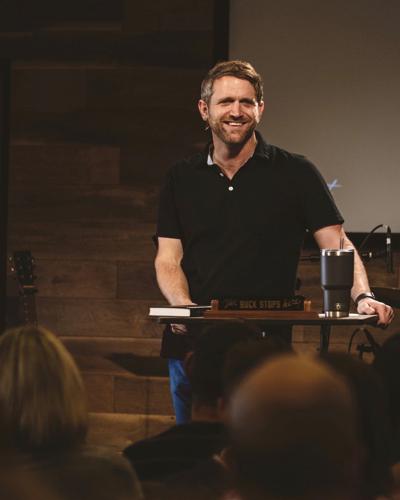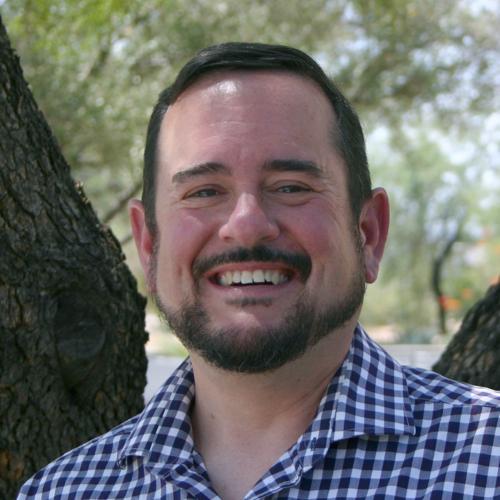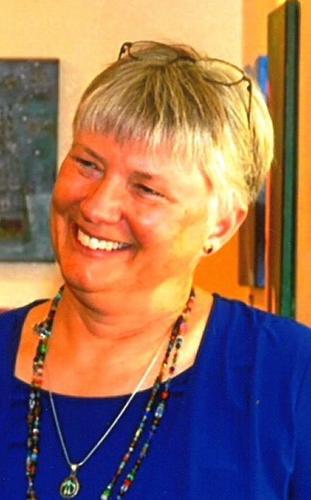Buried to Grow
It’s not a surprise to many when we read about how pollution has been a real problem over the last several decades. What might surprise us, however, are some of the current headlines regarding pollution during the COVID-19 outbreak. A quick Google search will reveal headlines such as, “Venice canals are crystal clear after coronavirus lockdown in Italy” or “Coronavirus restrictions, rain improve LA area air quality.” Now, right now we shouldn’t travel to Italy, or even LA, to confirm these claims with our own eyes. These prolific headlines, however, have made me wonder what pollution might dissipate in our own lives as a result of the coronavirus?
The recommended social distancing has forced many of us to change our routines, move our offices to our homes, and even begin to ration our family stash of toilet paper. Going to the grocery store feels more like a supply run than a shopping trip. At first glance this break in the norm might seem like a huge inconvenience, but what if this is exactly what God wants for us? What if this is God’s way of removing the pollutants that have slowly crept into our lives, changing us, and restoring the balance of faith, family, and profession? Instead of seeing this as an annoyance, what if we saw it as a gift from God? What if we saw this as an opportunity to reprioritize, slow down, and restore a healthy pace to life? What if we saw this as an excuse to spend quality time with our kids and a chance to rekindle the relationship with our spouse? What if we took this moment to bring our questions about God into the light, to join others with the same questions online for a church service, and spend some time seeking to get to know the Creator of the world? Embracing the One who loved us so much that He sent His only Son to die on a cross so that we could have life and have it abundantly (John 10:10).
So, my hope for us is that before we give in to the temptation to see this season as hopeless, we might pause, take 10 deep breaths, and see all the good that can come from it. And when the snow of this wintery season melts away and gives birth to a new time of fresh growth, my prayer is that before we rush to return to “normal,” we will have taken advantage of this brief pause in routine to ask ourselves the question, what do my family and my faith tell me about what normal should look like this time around? Is it possible that this tragedy is really a second chance?
As said by Winston Churchill, “never waste a good crisis.” I think this is some of the best advice we can take to honor all who have lost their lives during this wintery season, recognizing that we have been buried to grow, so that we might experience our most beautiful spring yet.
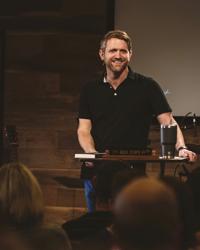
Andy Tracy
— Andy Tracy is the lead pastor at Lifepoint Church (azlifepoint.com). He was born and raised in Tucson and has a passion for the unchurched and dechurched. His desire is to be an authentic community of people striving to become more like Jesus.
'Why Do We Sing?'
This thought may seem pretty random, but it may be just the right time to think about it. It wasn’t too long ago that a friend from Davis-Monthan Air Force Base visited Hope City Church for the first time, and then we went to Costa Vida for lunch afterwards. Costa Vida is delicious, by the way! If you haven’t gone, I definitely recommend their food. So, while I was talking with my friend from the air base, I was curious about how his experience at Hope City was. Then came the question, “Why do we sing (in church)?” I loved the question. It was genuine. It was pure. It reminded me of the importance to never take something for granted. Why do we sing?
A while ago I was required to take a music class in college and I did so reluctantly. I’ve been to literally hundreds of concerts performed by a myriad of artists, but I had no desire to sit in a music class for a semester in college. I was stubborn and naïve. I’m so glad that I did. During that semester my eyes were opened to a realm of music history that fed my soul in ways I never imagined. Not only had I learned some things about our culture over time, but I found new ways to experience the world around me.
What kind of music do you like to engage with? How does your playlist fuel you for the opportunities you’re faced with each day? I must confess, even though I have been to many, many concerts, I usually prefer to be alone with my thoughts in a reflective sort of way. Yeah, that sounds weird to share with you, but it is true. However, there are very key moments in my life when things have been confusing or in disarray, and in those moments there has been a song that God has given me to hold onto. In each of those moments it has refocused my attention and given me hope.
There are deep connections that occur within us when we choose to embrace music and their lyrics, allowing them to renew our focus and refresh our soul. Why do you sing? What song are you holding onto in this moment of your life? Growing up, Motley Crue was the playlist for parties — Kick Start My Heart, specifically. Reggae was the playlist when I wanted to chill. Country music was there in a time of personal loss and pain — go figure. When our family relocated to Tucson from California, there was a song called Oceans by Hillsong United that got me through that time.
What music are you listening to right now? How is God using that to bring you focus and renew your soul? In this time of social distancing, it is my prayer that God would help you find a song that would touch your spirit and give you hope!
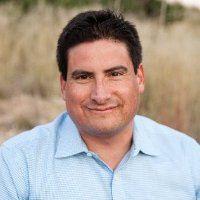
Jeff Logsdon
— Jeff Logsdon was a part of a team that started a church for college students in Southern California before relocating to Tucson with his family of five to start another church here. Hope City Church opened its doors in August 2018 and has partnered with many churches throughout the city to effectively serve the residents along the 22nd Street Corridor.
Hunker Down to Rise Up
Since moving to Tucson last August, I have enjoyed many incredible sunsets. I appreciate how frequently people pause to watch the spectacle, whether pulling over to the side of the road to snap a photo of the Catalina's turning pink or stepping out of Trader Joe’s on Oracle to watch the colors change behind the Tucson Mountains.
I imagine one reason we are drawn to the sun setting is that this marks an unmistakable time of transition. Of course, all times are times of transition, but we do not often notice. The sun at noon and the sun at 1 p.m. are markers of a rotating Earth, but most of us miss that. However, as the sun appears to move behind the mountain range, with shifting colors, reflections in the clouds, and light refracting through the atmosphere, we are witnesses to transformation.
It strikes me that we bear witness to this transformation without fear. The sun is vanishing, night is coming on, but most people do not seem concerned about that, do not seem afraid of the dark. This might be a different story if we believed that this were the final bow, that it was the last time we would see the light. However, we trust that the Earth will keep turning, that the light will return, and the sun will rise. Therefore we do not react in fear to the growing shadows, and instead we see the transition as an opportunity for letting go of striving and achieving, a time to hunker down, to get quiet, and to rest.
What if in times of transition, even times that seem to be moving us into shadows, we could trust that light will rise and/or we will rise into the light? What if instead of ignoring or fighting the transformation (imagine people resisting or fighting sunsets), we stopped and bore witness, we remained mindfully, prayerfully present to the transformation? What if we looked for glimpses of beauty in the shifts and changes? And what if, as we trust that light will return and we will see more clearly again, we allowed for such times to be reminders to let go of achieving and striving, to hunker down for a bit, to get quiet and listen, to rest in preparation for the rising?
In shifts toward the shadows, Jesus did not fight nor flee. Jesus attended to the Spirit, opened to higher power and deeper wisdom. Often, while it was still dark, Jesus chose conscious contact with God, Jesus chose to pray (“Now during those days he went out to the mountain to pray; and he spent the night in prayer to God” - Luke 6:12). And in the praying, in the listening, the sun rose, the light shone, which empowered him to love, heal, and bring hope to others. Some of his disciples practiced this on the Sunday after he had been crucified. These women had watched the encroaching shadows of Jesus’ crucifixion and death in the face of failed religious and governmental leadership and a fickle crowd. They then waited in the unknowing, not fixing nor fleeing nor fighting, but hunkering down, listening, resting and honoring Sabbath. And still in the pre-dawn that Sunday morning, they chose to journey to the tomb, to be present to grief and pain. Then, just like their Rabbi Jesus, they saw the sun rise, they experienced new light and new possibilities shining, and they carried this light to others!
Faith communities have moved through some of our most solemn holy days and celebratory feast days in physical separation from each other as the whole world abides in pandemic, great loss, insecurity, confusion, fear and sadness. So much in us wants to fight and flee, to somehow fast-forward through this time. This is not the transition any of us signed up for! However, we are reminded of the wisdom of the Jesus way, the wisdom of what some of us do each day as the sun sets and shadows close in: be present, pray, ask for divine wisdom and strength, listen, hunker down for a bit, and look for beauty so that we will not only see the light rise, but we will be part of light rising, embodying and enacting creative, beautiful, and life-giving justice and love in the world. No matter who we are or where we are on life’s journey, the Easter story reminds us that resurrection, new life, is available to, in, and through each and all of us here and now. We can choose daily to receive, share, and shine!

Michael T. Bush
— The Rev. Michael T. Bush is serving his 26th year as an ordained minister in the United Church of Christ, including congregations in Washington, Michigan, Connecticut and Pennsylvania. He was recently installed as the Senior Minister of Casas Adobes Congregational UCC in Tucson (caucc.org).
He is committed to a ministry of renewal through engagement with sacred stories, theological reflection, and spiritual practices that deepen our roots in the Spirit so that we can reach out widely to the world in justice, inclusion, love, and hope.
Bush co-authored "Chaos & The Kingdom" and has two additional books in the editing phase in support of these practices of spiritual renewal.
Fear is contagious but so is faith
There's an old parable about a holy man meeting Death on the road. The holy man asks Death where he is going and what he will do there. Death replies that he is going to a town to kill 100 people. The holy man, while sad, blesses Death on his journey. Some weeks later, the holy man meets Death on the road again. The holy man speaks, "Death, why did you lie to me? You said you were going to kill 100, yet 1,100 died!" Death replied, "I did only kill 100. The thousand died of fear."
In "Living the Science of Mind," Ernest Holmes wrote, "The quickest and most effective method to get rid of fear is to get quiet and lift up the whole thought in confidence and faith to something bigger than we are. It is like going from a cold, dark room into the sunshine, and just sitting there, letting the rays of the sun penetrate the whole being with warmth and color until the darkness and the dampness are gone. So it is with the life of prayer and faith, of affirmative meditation, and of communion with the Divine Spirit which is closer to us than our very breath.
Let us not forget that if fear is contagious, faith is doubly so. How wonderful it is to realize that we can so influence our environment that everyone who steps into it will be benefitted. If this is what we are doing, the very stars in their courses will conspire to aid us.
And we may be certain of something else — there is at the center of our being, a strong fortress of faith, placed there by a Power greater than we are, by and Intelligence that knows everything, and forevermore held in place by a Divine Presence which is God in us. It is to this indwelling God we must turn."
We all know that fearful living endangers our health. Being cautious and careful in our interactions is wise and sensible. But continuously frightening ourselves, by focusing and fixating on the calamitous news of the world, or being angry because someone doesn't respond in the way we believe they should in a particular situation, benefits no one, and increases the general misery of the world.
It is much healthier for mind, spirit, soul and body to limit consumption of the news, sit in the sun, breathe slowly and deeply, connect with the Divine Presence in prayer and meditation or contemplation, bless those around us, connect by phone or other electronic media to those who are not in our same household, and make time to appreciate the good and beautiful in our lives. And please, stay home as much as possible, maintain safe distances when you do have to go out and wash your hands. Bless you.

Rev. Janis Farmer
— Rev. Janis Farmer is an ordained minister of religious science and ministers at The Center for Spiritual Living Tucson. Additional information about us can be obtained at tucsoncsl.org, and specific questions answered, and prayer support received, via email at info@tucsoncsl.org.


